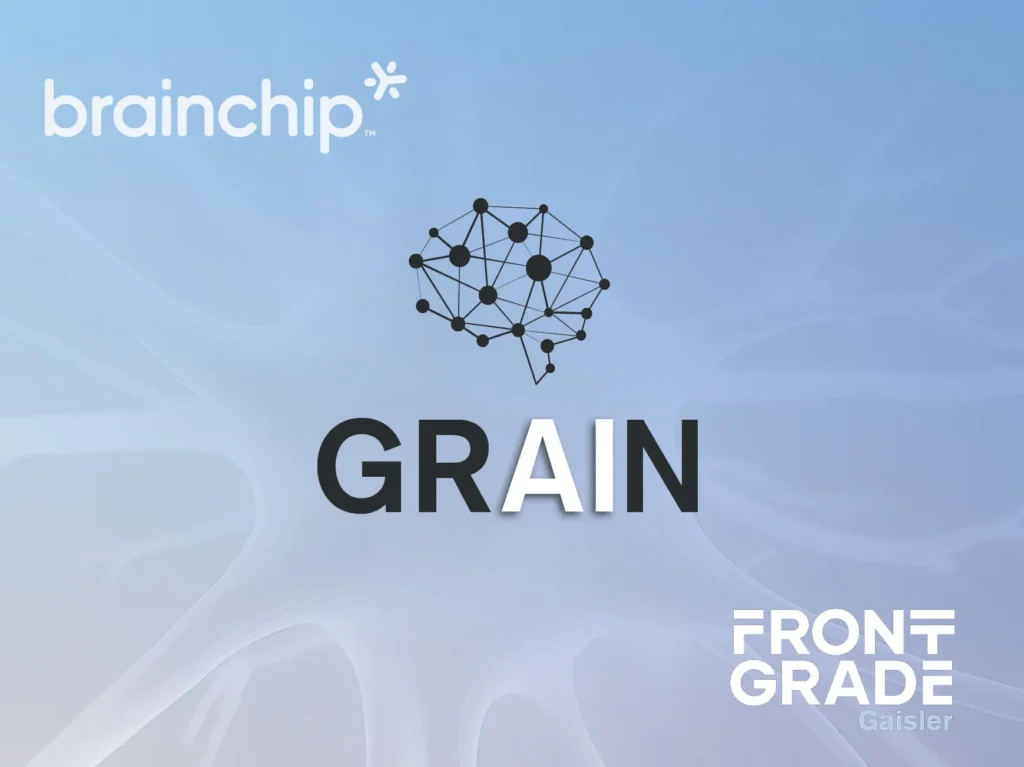
Frontgrade Gaisler Unveils GRAIN Line, Wins SNSA Contract for Space AI
Frontgrade Gaisler, a renowned provider of radiation-hardened microprocessors for space missions, has been awarded a significant contract by the Swedish National Space Agency (SNSA) to commercialize the first neuromorphic System on Chip (SoC) device specifically designed for space applications. This new technology, currently under development, falls under the company’s innovative GRAIN (Gaisler Research Artificial Intelligence NOEL-V) product line.
Introduction to the GRAIN Product Line
The first SoC device in the GRAIN series, the GR801, incorporates cutting-edge Akida™ neuromorphic technology developed by BrainChip, a pioneer in ultra-low power, fully digital, event-based neuromorphic AI. This integration combines Gaisler’s NOEL-V RISC-V processor with BrainChip’s Akida neuromorphic AI processor into a single, highly efficient circuit. This unique combination is engineered to enable AI-driven applications in space environments while optimizing power consumption.
To further advance this technology, Sweden’s Royal Institute of Technology (KTH) is collaborating with Frontgrade Gaisler by developing a demonstration application. This system will utilize a neuromorphic sensor directly interfacing with the GR801 device, showcasing its potential in real-time space applications.
Expanding AI Capabilities in Space
Frontgrade Gaisler has strategically designed the GRAIN product line to support both commercial and institutional space missions. By prioritizing energy-efficient AI, the company aims to facilitate more autonomous and advanced space explorations while adhering to the strict power and weight limitations inherent to space-bound systems.
According to Sandi Habinc, General Manager at Frontgrade Gaisler, “Our latest innovation opens new avenues and complements our existing range of proven and reliable processing products. GRAIN is an exciting new pursuit for Gaisler because we are well positioned to enable new capabilities for real-time data processing, autonomous navigation, Earth observation, and object detection and tracking.”

BrainChip CEO Sean Hehir also emphasized the importance of the collaboration, stating, “Our continued work with Frontgrade Gaisler to integrate Akida IP into space SoCs highlights the critical need for environmentally hardened AI solutions. We have ensured that our neuromorphic technology meets the low-energy, low-latency, and high-performance requirements of space-based applications.”
The Significance of Neuromorphic Computing in Space
Neuromorphic computing represents a paradigm shift in artificial intelligence, designed to mimic the functionality of the human brain by processing information through event-driven architecture rather than conventional binary logic. Unlike traditional AI processors that require significant computational resources and energy, neuromorphic processors are inherently efficient, making them ideal for space missions where power is a crucial constraint.
The Akida AI processor by BrainChip enables on-chip learning and inference, eliminating the need for cloud-based computations. This capability not only reduces data transmission needs but also enhances security and privacy, which are critical in space applications. By integrating this technology into the GR801 SoC, Frontgrade Gaisler is paving the way for smarter, self-learning spacecraft capable of performing tasks such as adaptive navigation, in-situ data processing, and enhanced situational awareness.
Unveiling GRAIN at the RISC-V in Space Workshop 2025
The announcement of the GRAIN product line was made at the second RISC-V in Space Workshop 2025, held in Gothenburg, Sweden. This event served as a platform to discuss the growing role of RISC-V technology in space systems, including satellites and deep-space missions.
RISC-V, an open-source instruction set architecture, is gaining traction in space applications due to its flexibility, cost-effectiveness, and ability to be customized for mission-specific needs. By incorporating RISC-V processors into their new SoCs, Frontgrade Gaisler ensures compatibility with a wide range of aerospace systems while promoting innovation and collaboration in the space sector.
About the Key Players
Frontgrade Gaisler
Frontgrade Gaisler, a subsidiary of Frontgrade Technologies, is a leading supplier of radiation-hardened microprocessors and IP cores designed for critical applications in space. With decades of experience, the company’s processors have been integral to numerous space missions, operating in environments ranging from Mercury to Neptune.
Frontgrade Technologies
As a major provider of high-reliability electronics, Frontgrade Technologies specializes in radiation-assured solutions for defense, intelligence, commercial, and civil applications. With a history spanning over 60 years in space flight heritage, the company’s offerings include mission processing subsystems, rad-hard components, custom ASICs, antennas, power management solutions, and more.
Swedish National Space Agency (SNSA)
SNSA, operating under the Ministry of Education, is responsible for Sweden’s national and international space activities, focusing on research and development. Through collaborations with leading technology firms, the agency aims to drive innovation and maintain Sweden’s competitive position in the global space industry.
KTH Royal Institute of Technology
The KTH Neurocomputing Systems (NCS) team, led by Professor Jörg Conradt, is at the forefront of neuromorphic computing research. Their work explores theoretical models and practical applications of distributed neuronal processing, contributing valuable insights into AI-driven space technologies.
BrainChip Holdings Ltd
BrainChip is a global leader in Edge AI, pioneering neuromorphic processing solutions with its Akida AI processor. By mimicking the brain’s neural network functionality, Akida enables real-time, power-efficient AI applications across industries, including aerospace, automotive, consumer electronics, and industrial IoT. The company, founded in Australia in 2004, is publicly listed on the Australian Stock Exchange (ASX).
The Future of AI in Space
As AI-driven space applications continue to evolve, the integration of neuromorphic processors like the GR801 represents a transformative leap in how spacecraft process information and make autonomous decisions. With its ability to operate efficiently in harsh space environments, this technology holds immense potential for deep-space exploration, planetary missions, and satellite intelligence.
Through strategic partnerships and continuous innovation, Frontgrade Gaisler, along with its collaborators, is leading the charge toward the next generation of space computing. The GRAIN product line is not just an GRAIN advancement in AI technology but a crucial step in enabling smarter, self-sufficient spacecraft that can operate beyond Earth’s boundaries without constant human intervention.




